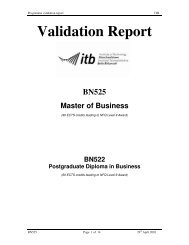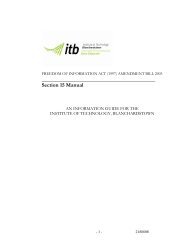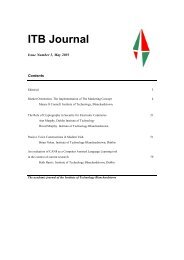ITB Journal-May-2003 - Institute of Technology Blanchardstown
ITB Journal-May-2003 - Institute of Technology Blanchardstown
ITB Journal-May-2003 - Institute of Technology Blanchardstown
You also want an ePaper? Increase the reach of your titles
YUMPU automatically turns print PDFs into web optimized ePapers that Google loves.
<strong>ITB</strong> <strong>Journal</strong><br />
The Process And Problems Of Business Start-Ups<br />
Natasha Evers<br />
<strong>Institute</strong> <strong>of</strong> <strong>Technology</strong> <strong>Blanchardstown</strong><br />
Natasha.Evers@itb.ie<br />
ABSTRACT<br />
“… there is little known about the initial phases <strong>of</strong> the process (<strong>of</strong> entrepreneurship).<br />
The conception, birth and early development <strong>of</strong> new ventures are very much an<br />
uncharted territory”.<br />
(Reynolds and White,<br />
1997:1).<br />
This paper sets out to examine the process and problems encountered by new business<br />
start-ups. A didactic overview, based on past and current literature in the field,<br />
identifies the most common theoretical frameworks frequenting the academic literature<br />
and assesses their contribution to explaining and understanding the Process and<br />
Problems <strong>of</strong> New Venture Creation.<br />
The founding <strong>of</strong> a new organisation is not instantaneous and the process is a largely<br />
complex one. The nature <strong>of</strong> this process - which is characterized by spontaneity and<br />
uncertainty - makes it more difficult to pin down an exact theory. As Gartner (1985)<br />
points out, entrepreneurial firms are too diverse to permit generalization, and the<br />
process <strong>of</strong> starting up a new business has become a multidimensional phenomenon. The<br />
different approaches, suggested in literature, explaining the process <strong>of</strong> new venture<br />
creation, have attracted much academic controversy, given the lack <strong>of</strong> consistent<br />
empirical research on the process <strong>of</strong> new business creation. In this light, the author<br />
suggests that a more holistic understanding <strong>of</strong> the process may be gained through the<br />
integrated theoretical frameworks <strong>of</strong> new venture creation presented in the literature,<br />
which aim to capture the most important variables and characteristics <strong>of</strong> the new<br />
venture creation process.<br />
The second part <strong>of</strong> the paper deals with the problems facing entrepreneurs in new<br />
venture creation. Many start-ups never reach establishment, and the majority close up<br />
within one year after they have become established. Embarking on a new business is<br />
one <strong>of</strong> adventure and challenge but it brings with it high risk and uncertainty. This<br />
paper does not seek to detail each and every industry-specific problem that start-ups<br />
experience, but aims to identify and examine the most common difficulties encountered<br />
by Start-Ups in the early stages <strong>of</strong> establishment, irrespective <strong>of</strong> sector or industry.<br />
1. Objectives <strong>of</strong> paper<br />
1.1 Objectives And Scope<br />
This paper will examine the process and problems encountered by new business start-ups in<br />
the field <strong>of</strong> entrepreneurship. It aims to provide a didactic overview based on past and current<br />
literature in the field, identifying the most common theoretical frameworks frequenting the<br />
Issue Number 7, <strong>May</strong> <strong>2003</strong> Page 17
















